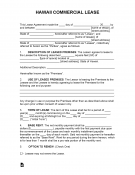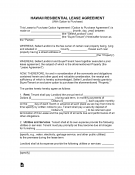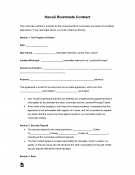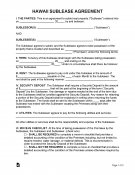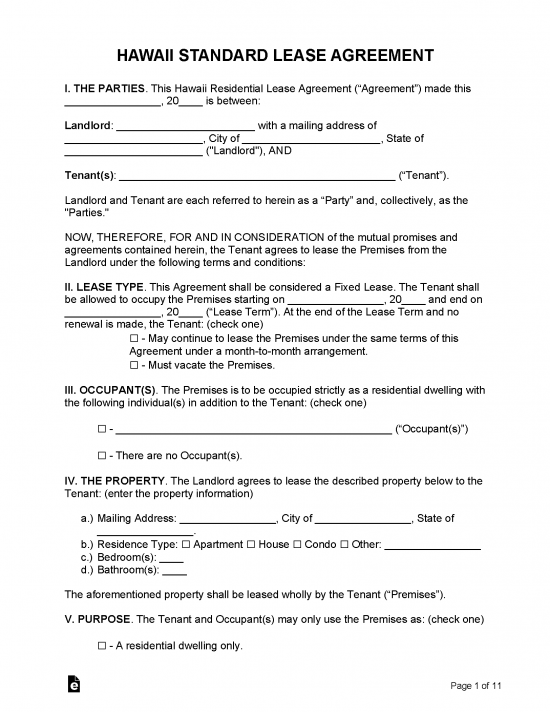Hawaii lease agreements are bindings contracts between landlords and tenants that set the terms of a lease of a residential or commercial property. The agreements will include the monthly rent, the duties that the landlord owes to the tenant and the tenant to the landlord, as well as other details, such as specifics on the obligation to pay for utilities. Both parties should maintain a copy of the lease agreement, and can rely on it to clarify rights and minimize disputes.
Contents
By Type (6)
- Commercial Lease Agreement
- Month-to-Month Lease Agreement
- Rent-to-Own Lease Agreement
- Roommate Lease Agreement
- Standard Lease Agreement
- Sublease Agreement
Download: Adobe PDF, MS Word, Rich Text Format
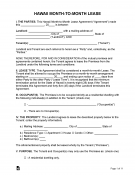 Month-to-Month Lease Agreement
Month-to-Month Lease Agreement
Download: Adobe PDF, MS Word, Rich Text Format
Download: Adobe PDF, MS Word, Rich Text Format
Download: Adobe PDF, MS Word, Rich Text Format
Download: Adobe PDF, MS Word, Rich Text Format
Download: Adobe PDF, MS Word, Rich Text Format
Landlord-Tenant Laws
Statutes – Chapter 521 (Residential Landlord-Tenant Code)
Required Disclosures (3)
Property Condition Form – The landlord must provide a copy of this form so that the parties may note the condition of the premises in addition to any furnishings or appliances (§ 521-42(6)).
Lead-Based Paint Disclosure – Federal law requires all landlords or their agents, such as property managers, to give this disclosure to all new tenants if the property was constructed before the year 1978.
Identification – Landlord must disclose the names of their agents who will be allowed onto the premises, with the tenant’s permission, during their tenancy. In addition, the landlord must provide their tax excise number to the tenant so that they may be able to file for a low-income tax credit if they qualify (§ 521-43).
Security Deposit Laws
Maximum Amount ($)
A landlord may charge no more than one (1) month’s rent as a security deposit. For tenants that have pets in buildings where they are permitted, the landlord may charge an additional, agreed-upon amount, for potential damages caused by the animal, so long as the amount is less than one month’s rent. This supplement may not be charged for those who rely on an animal for assistance with a disability (§521-44).
Returning to Tenant
If the landlord plans to retain any amount of a security deposit, the landlord must notify the tenant in writing within fourteen (14) days. The notification must include a description of the repairs for which the security deposit is being retained, and evidence of the costs the landlord has incurred. If the landlord does not provide this within the fourteen-day time period, the landlord will be deemed to have forfeited the right to retain any of the security deposit. (§521-44)
When is Rent Due? (grace period)
The landlord and tenant will agree to a due date for monthly rent. For most tenants, there is no grace period. However, for tenants receiving public assistance, the tenant may delay paying rent until three (3) days after the day on which the assistance check is usually received, paying a prorated amount to cover any time between that day and the standard due date (§521-21).
Eviction Notice (non-payment)
 15-Day Notice to Quit – If the tenant fails to pay rent, the landlord may use this form to meet the legal obligation of notice, letting the tenant know in as soon as fifteen (15) days the landlord may initiate eviction proceedings. (§ 521-68)
15-Day Notice to Quit – If the tenant fails to pay rent, the landlord may use this form to meet the legal obligation of notice, letting the tenant know in as soon as fifteen (15) days the landlord may initiate eviction proceedings. (§ 521-68)
Download: Adobe PDF
Maximum Fees ($)
Late Rent Penalties
Hawaii law does not specify a maximum late rent fee, but the amount should be included in the rental agreement.
NSF Checks
Hawaii law does not specify a maximum fee for a rent check given with insufficient funds, but the amount should be reasonably related to costs the landlord must bear as a result of the bounced check.
Tenant’s Unclaimed Property
When a tenant leaves personal property behind after leaving a landlord’s property, whether through abandonment or through expiration of the lease, the landlord may store the property, sell the property, or donate the property to charity. If the landlord chooses to sell or donate the property, the landlord must attempt to notify the tenant in writing, and then publish notice of the impending sale in a daily newspaper of general circulation for at least three (3) days. If the landlord does not hear from the tenant, the landlord may donate the property, or if selling, use a portion of the proceeds to pay off any remaining debts. The sale or donation may not take place until at least fifteen (15) days after the notice was sent. Any amount remaining after settling debts must be held in trust for the tenant by the landlord for at least thirty (30) days, after which it reverts to the landlord (§521-56).
